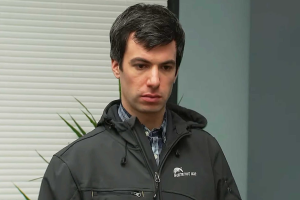Vancouver Talmud Torah teacher Shoshana Burton was determined to make national anti-bullying day on Feb. 22 meaningful to her two Grade 7 tikkun olam classes.
So in preparation, she invited Fred Miller, 62, a formerly homeless resident of Vancouver’s Downtown East Side, to address the students, answer their questions and give insight into his life journey and the adversity he has experienced.
“I wanted students to hear firsthand the life story of someone who is part of a group we tend to quickly judge, a group that is treated negatively,” said Burton. “I hoped it would help them develop an awareness of this judgment and see it quickly replaced with compassion, empathy and kindness.”
READ: THE MOTIVATIONS AND HARDSHIPS OF ISRAEL’S LONE SOLDIERS
The Grade 7 classes had discussed how stereotyping and biased behaviour in their daily lives can contribute to bullying. “We were trying to understand the many causes for homelessness and the many untrue myths and stereotypes based on assumptions we make, which impact our behaviour towards the homeless,” Burton explained.
On Feb. 7, the students’ attention was focused on Miller, who described growing up in Wolfville, N.S., in a family with a drunk and abusive father. Sent to a juvenile delinquent centre, he was cut off from his siblings and family. He later served 10 years in a Saskatchewan jail for armed robbery and eventually ended up on the streets of Vancouver, addicted to drugs.
“A person doesn’t have any money if he’s using drugs,” he told the students. “You end up not having a home. You end up in doorways smoking a crack pipe, hiding from your parents. There’s kids down there on the Downtown East Side that are 16, injecting cocaine and crack.”
Miller admitted to spending charitable money given him by kind passers-by on alcohol, but said he has overcome his addiction and is one of the lucky ones, having done so while living in the midst of temptation.
In a presentation by Covenant House, a local organization that provides outreach and assistance to youths living on Vancouver’s streets, the students learned there are between 500 and 1,000 people living on Vancouver’s streets each night.
Asked what he wanted most while living on the streets, Miller said simply “a hug.”
“The major thing that stood out to me was that he didn’t feel loved when he lived on the streets,” said student Sophie Chelin, 13. “He said that people would walk by without acknowledging his presence and would step over him. I didn’t understand the impact of a small gesture like a hug to a homeless person, and that these small gestures can make them feel loved and feel like they are something.”
Ava Abramowich said she learned the importance of respecting the homeless and treating them with humanity.
“A lot of people think homeless people are hungry and kind of gross, but when you talk to them you realize they’re people, too, and they have feelings. Fred Miller didn’t have supportive parents like a lot of us do and he took the wrong path and made choices he might not have made had he known any better. I learned we have to be really grateful for our parents because they’re our role models and our teachers.”
The students visited the Downtown East Side Feb. 21 to talk to some of its homeless residents. They handed out coffee and doughnuts, as well as “boxes of love” containing letters, granola bars, mini shampoo bottle, teddy bears and other items they thought might make recipients feel loved.
Burton’s unorthodox teaching methods have already had a significant impact on her students.
“I found it very sad that one of the things people want on the streets is a hug,” said Maya Miller, 12. “People living on the streets are probably cut off from their families and have no friends, no one who loves and cares for them… The reason they want a hug is to interact with someone, feel appreciated and feel like a human being. They all have a story, and they’re people, too.”







